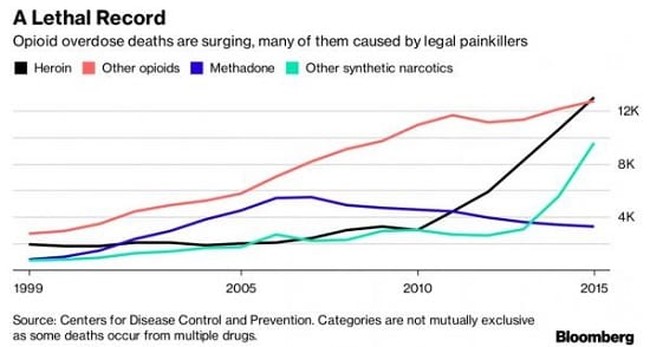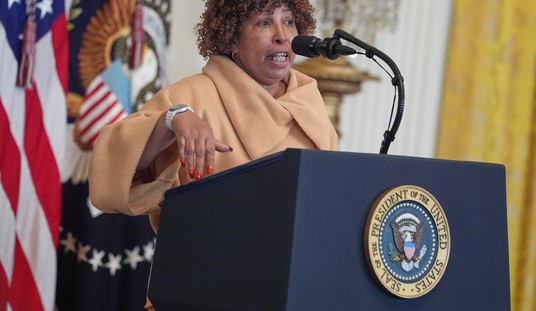
On the front burner these days is the so-called opioid crisis or epidemic. Personally, I don’t consider crappy decision-making, even on a large scale, to be a crisis or epidemic. Just like I don’t consider obesity to be an epidemic. In the latter instance, there is no one holding you down and cramming Krispy Kremes down your throat. In the case of opioids, there is no mysterious force making people become drug addicts or overdose. But to understand the context, deaths due to overdoses of legally available opioids has skyrockteted:

Now we are reacting to it the way the government does when it encounters an unexpected problem: when in danger, when in doubt, run in circles, scream and shout.
Money is being thrown at the problem with scarce a care for what we are purchasing. Pharmaceutical companies are being blamed. Doctors are being blamed. It is merely a matter of time before global warming is to blame. How did we get here?
Today, the Daily Caller has an interesting story.
The DEA’s Office of Diversion Control is responsible for deciding who is legally allowed to handle controlled substances. They not only decide which facilities manufacture controlled substances, they set production quotas, and they license every doctor who is allowed to write prescriptions for opioids.
Admitted drug addicts and dealers were among the hundreds of thousands of people and businesses the Drug Enforcement Administration (DEA) licensed to manufacture, distribute or prescribe pharmaceuticals over the past 12 years, a Daily Caller News Foundation investigation has found. The agency stripped only 240 licenses for wrong-doing over the same period.
The DEA’s Office of Diversion Control, which is responsible for issuing and revoking the permits, is, by law, fully funded by the licenses’ application fees. More than 1.7 million individuals and organizations held licenses as of March 2018 — an increase of more than 510,000 since August 2006, the earliest publicly available data, TheDCNF’s review found.
The US population did not increase by nearly 50% in that time. The number of MDs, thanks to the iron stranglehold US medical schools maintain over the number of doctors trained, has stayed basically flat. So what has changed?
There are a couple of possible answers.
Although the DEA’s diversion control office is supposed to be fully funded through the fees people pay to acquire the drug licenses, it’s faced periods of especially tight budgets, according to a 2008 IG report.
“I do think it is odd that the office has to be funded out of licensee fees,” Caulkins told TheDCNF. “It should be funded at whatever level it takes to get the job done. Perhaps that is less than the license fee revenue. Perhaps it is more.”
If you are funded through licensing fees and are facing a harsh fiscal environment, one way to help yourself is by being very “customer friendly.”
And whenever you’re dealing with any government entity you can’t rule out sloth and/or stupidity.
Meanwhile, the DEA gave out licenses to people who admitted to having been addicted to or dealt drugs in the past.
One dentist, for example, admitted to helping “an outlaw motorcycle gang” manufacture methamphetamine in the early 2000s, which resulted in two years of jail time, a DEA document said. He’d previously been caught with meth several times and admitted to “a history of substance abuse with alcohol, marijuana, methamphetamine and cocaine.”
The DEA gave him a license to prescribe certain drugs in September 2013.
A doctor was caught distributing cocaine in 1981 but wasn’t prosecuted because he cooperated with authorities, another DEA document shows. He was arrested again in 2001 with cocaine and two prescription drugs — an opioid and a minor tranquilizer — and pleaded guilty to related charges in 2003.
The DEA gave him a license to prescribe drugs in February 2009.
…
More than 760 people of the then-1.4 million registered with the DEA “were potentially ineligible” for licenses because the Social Security Administration reported them as dead, they did not have state-level permission to prescribe or distribute controlled substances or “were incarcerated for felony offenses related to controlled substances,” the 2016 GAO report stated.Also, nearly 700 Social Security numbers in the DEA’s database were registered to multiple names or variations of names, “which can be a risk indicator of potential fraud,” the report showed.
Another nearly 42,000 entries in the DEA’s database listed an employer identification number rather than a Social Security number, the GAO found, which makes it more difficult to conduct background checks and prevent fraudulent identities.
In fact, one person convicted of defrauding Medicare in June 2013 was still actively registered with the DEA to dole out drugs as of January 2016, the GAO pointed out. The drug agency had no notes about the crime in its system.
I have to admit admiring someone ballsy enough to apply to the DEA for a license to deal drugs and use a fake social security number.
In 1970, cartoonist Walt Kelly used his comic strip “Pogo” to create one of the best descriptions of how major problems arise in any society at any time: We have met the enemy and he is us.
Sad to say, it looks as though the agency that is supposed to keep addictive drugs out of the wrong hands may have had a role in making widespread opioid addiction possible.













Join the conversation as a VIP Member